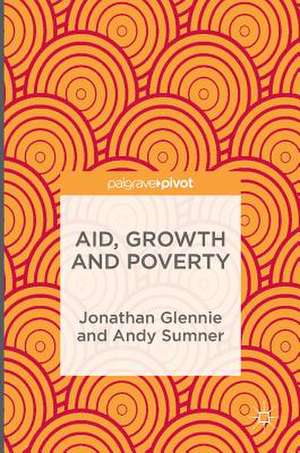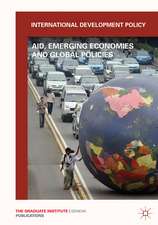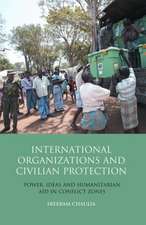Aid, Growth and Poverty
Autor Jonathan Glennie, Andy Sumneren Limba Engleză Hardback – 16 iun 2016
Preț: 380.63 lei
Nou
Puncte Express: 571
Preț estimativ în valută:
72.83€ • 76.24$ • 60.62£
72.83€ • 76.24$ • 60.62£
Carte tipărită la comandă
Livrare economică 31 martie-14 aprilie
Preluare comenzi: 021 569.72.76
Specificații
ISBN-13: 9781137572714
ISBN-10: 113757271X
Pagini: 88
Ilustrații: XIII, 82 p. 4 illus., 1 illus. in color.
Dimensiuni: 148 x 210 x 12 mm
Greutate: 0.24 kg
Ediția:1st ed. 2016
Editura: Palgrave Macmillan UK
Colecția Palgrave Macmillan
Locul publicării:London, United Kingdom
ISBN-10: 113757271X
Pagini: 88
Ilustrații: XIII, 82 p. 4 illus., 1 illus. in color.
Dimensiuni: 148 x 210 x 12 mm
Greutate: 0.24 kg
Ediția:1st ed. 2016
Editura: Palgrave Macmillan UK
Colecția Palgrave Macmillan
Locul publicării:London, United Kingdom
Cuprins
Chapter 1: Introduction.- Chapter 2: A history of aid effectiveness.- Chapter 3: Assessing aid: Conceptual and methodological issues.- Chapter 4: Aid, growth and poverty: What we know and what we don't.- Chapter 5: Conclusions.-
Recenzii
“This book is a quick and easy read for academics, experts, and advocates in the development assistance and global studies arena. And the findings are relevant to move forward the discussion on creating policies to make aid more effective. It provides relevant background information for those who are new to international relations or are just learning about how aid works … .” (Sabine Iva Franklin, Medicine, Conflict and Survival, Vol. 32 (3), 2016)
Notă biografică
Jonathan Glennie is Director of Policy and Research at Save the Children UK, and Visiting Fellow at King’s College London. He has worked and written extensively on international poverty and human rights, and helped to develop Christian Aid’s now-ubiquitous critique of global tax policy. Jonathan is a regular columnist for The Guardian’s Global Development website, and is on the board of Peace Brigades International, as well as the Sheffield Institute for International Development.
Andy Sumner is Reader in International Development and Co-Director of King’s International Development Institute, King’s College London. He holds associate positions at Oxford University at the Oxford Poverty and Human Development Initiative and the Center for Global Development in Washington, DC. He has been listed in Foreign Policy Magazine’s ‘Top 100 Global Thinkers’ and is Deputy Editor and Editorial Board Member of the Journal Global Policy.
Andy Sumner is Reader in International Development and Co-Director of King’s International Development Institute, King’s College London. He holds associate positions at Oxford University at the Oxford Poverty and Human Development Initiative and the Center for Global Development in Washington, DC. He has been listed in Foreign Policy Magazine’s ‘Top 100 Global Thinkers’ and is Deputy Editor and Editorial Board Member of the Journal Global Policy.
Textul de pe ultima copertă
The authors discuss the impact of foreign aid and tackle the question of why assessing the impact of aid is so difficult. The authors focus on peer-reviewed, cross-country studies published over the last decade and draw together some global-level assessments, considering the context and conditions under which aid might be said to ‘work’. Glennie and Sumner argue that the evidence in four areas shows signs of convergence that may have direct relevance for policy decisions on aid and for aid effectiveness discussions. These are as follows: Aid levels (meaning if aid is too low or too high); Domestic political institutions (including political stability and extent of decentralisation); Aid composition (including sectors, modalities, objectives and time horizons); and Aid volatility and fragmentation. Notably, this study finds that there is no consensus that the effectiveness of aid depends on orthodox economic policies.

















